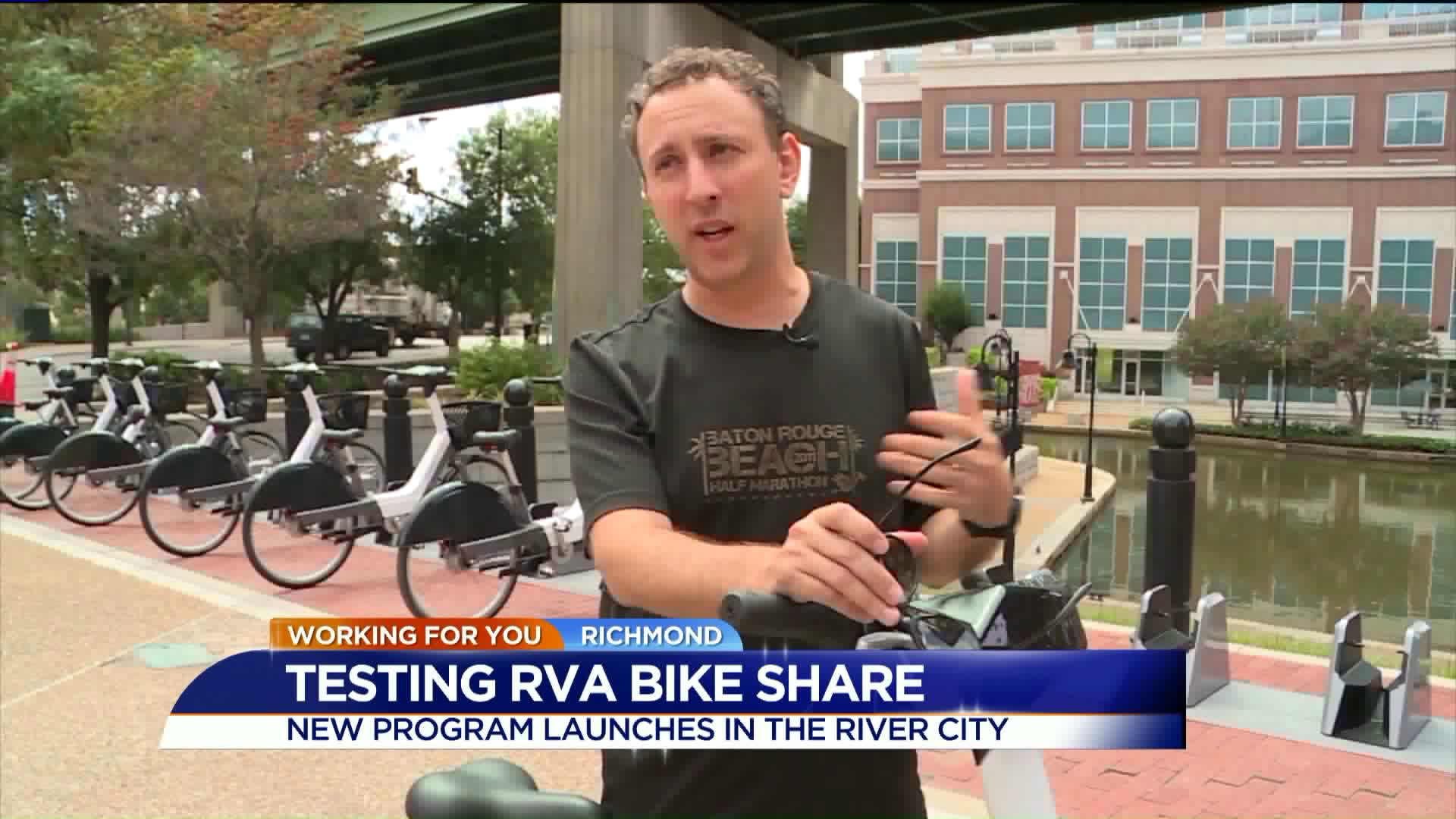RICHMOND, Va. – People walking downtown Wednesday stopped to explore the new RVA Bike Share hub at the Turning Basin in Shockoe Bottom, where more bikes were rented out than there were docked.
The program had a rainy day launch the day before, after an almost year delay. The first round rolled out with sixteen stations and 220 bikes.
The city chose Canadian-based vendor Bewegen Technologies Inc. to supply the bikes, which all have a basket, horn, front and back lights and a lock. The vendor was the first to offer pedal assist in North America, which will be rolled out in “very short order,” according to City Bicycle, Pedestrian and Trails Coordinator Jakob Helmboldt.
“This is just the beginning, the introduction of bike share to the city,” Helmboldt said. The city hopes to next double the size of their program in addition to the electric pedal assist.
Helmboldt explained that logistics had a lot to do with the delay, from securing suitable locations, planning for electric connections for when pedelec bikes are added, and the many concurrent projects underway throughout the city.
Ron Gubitz, on business in Richmond from New Orleans, ran into a technical glitch at the kiosk Wednesday, but he thought the overall experience was ultimately rewarding.
“It would have been better if the screen worked and I could have slid my credit card,” Gubitz said.
He instead quickly downloaded the app and entered his credit card, which gave him a code to type in at the bike hub.
Short term uses range from $1.75 for one use or a day pass for $6. A seven-day pass will cost $12, and monthly and annual memberships are available for $18 and $96, respectively. Payment by credit or debit card should be available at docking stations or through the smartphone app.
Gubitz said despite the initial challenge, he thought the app and the pricing compared well to other cities like Portland and Washington D.C.
“This seemed pretty easy for someone who doesn’t live here to get a bike,” he said. The day before he had enjoyed a run along the Canal and was looking forward to exploring the Capital Trail for about a 30-minute bike ride.
“For me, as a business traveler who can pick up a bike for $5 for 30 minutes – that’s a gem – I don’t get that everywhere,”Gubtiz said. “I just wish there were helmets – the basket and extra lock are nice – but the helmet…that is really important.”

Ron Gubitz rides off
“This is a city initiative and city-owned service for the benefit of the entire public,” said Mayor Levar Stoney at the launch. “This adds to the vibrancy of the city. You want make it a city where you can live, work and play – and also have multimodal access to different parts of the city and that is what this will do.
“This will bridge the gap between those who don’t have transportation and those who do,” he added.
Jim Duffney, CEO of Corp Logistics, will oversee maintenance. He has an extensive military background and has also helped Baltimore with its bike share program.
“One of his main missions is to serve the veteran community, especially veterans that are facing challenges reintegrating into the workforce –whether it's homelessness or addiction, a number of different things – that’s a critical part of what he does,” Helmboldt said.
Users who run into problems with the app or kiosks are asked to contact 1-877- RVA-BIKE.
"We launched the system yesterday and today we`re catch up mode," Duffy said.
“This is just the beginning, the introduction of bike share to the city,” Helmboldt said.
Additional stations are being lined up for the second phase and in some cases will require agreements with state and private entities that own the property; some will be added in the fall and others in early spring.
"The business community is already talking about bike share on social media and encouraging people to use it to get to their business," Helmboldt said. "We think that will also prompt businesses to start advocating for stations near them."
It could be next year before pedelec bikes are added to the fleet.
"Production of the pedelec bikes has a substantial lead time so we'll need to look at where the procurement and fabrication schedule takes us," Helmboldt explained.
The City received grant funding from the federal Congestion Mitigation and Air Quality (CMAQ) Program for both capital costs and the first year of operational costs. The City provided a 20% match for the first phase of the system launch ($280,000). As a result, the first phase is currently funded at $1.34 million total.
There is $1.9 million funded by CMAQ for the second phase of the project.
The kiosks are accessible 24 hours a day.




